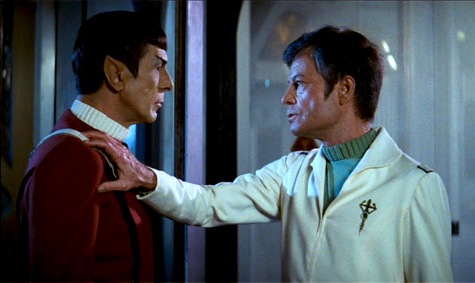With the third Star Trek reboot film on the way, fans have their fingers crossed hard. Everyone has been pushing for a film that does what Star Trek has always said on the tin—explore the final frontier. And fans have been promised exploration is part of the bargain. But you know what I’ve been holding out for?
More Doctor McCoy. Because if McCoy is important to the film, then all those other problems kind of solve themselves automatically.
So… I love Kirk and Spock. Like, probably an unhealthy amount. But while it’s nice that their friendship has been central to the Abrams reboot, I’m not really sure it needed that much retreading. Kirk and Spock are basically the PB&J of science fiction. You know they’re a pair, they’re everywhere, and they are universally liked by and large (even by people who know next to nothing about sci-fi). The first film set that up all over again, and that was fine. It was sweet and poignant. Then Into Darkness seemed to think it needed to prove that harder, faster, more. NO, THEY ARE SOULMATES, DO YOU GET IT? DO YOU UNDERSTAND NOW?
We really do get it. It’s cool.
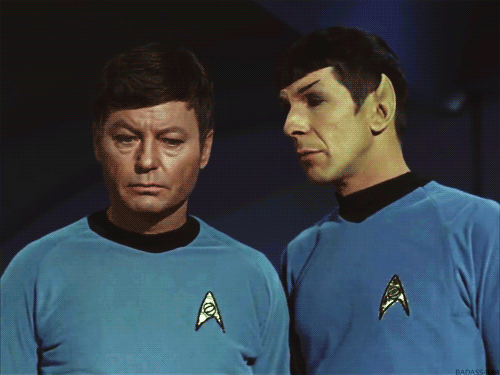
And in rebuilding what was never broke in the first place, the second film utterly waylaid one of Trek’s most important characters. It ignored Doctor Leonard McCoy.
I should be clear—I want more of everyone. I want Uhura in charge of away missions, and Sulu giving history lessons to Kirk on the bridge when he forgets vital information, and I want Chekov to puppy face his way into intergalactic peril. The Original Series—as seminal as it was—was never quite the ensemble show it was capable of being, and the films have the ability to play that hand better than ever before. They should go for it. They should give all these characters their due, and not just with cute little shout outs to their original counterparts.
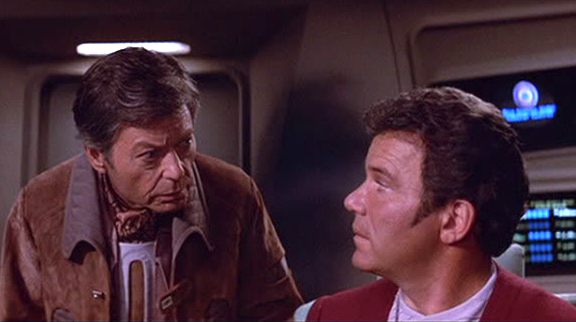
But the point is, when Doctor McCoy is missing from a Trek narrative, you already know you’ve lost something essential; you’ve lost your complexity. And Star Trek is meant to be complicated. Not logistically, but morally, philosophically, humanistically. It’s easy to love the duo of Kirk and Spock because they’re bonded to the end of the universe. They exist to bolster each other, to make each other the best versions of themselves. And for that reason, people often forget that the duo of Spock and McCoy is just as important.
Kirk is a captain, right? He exists to be a control node, to funnel information and tactics to their most useful location. Essentially, he’s a project manager. (He’s also part adventurer, but that’s a whole other problem.) And when you’re managing things, you need the best possible people feeding you perspective. Spock is a First Officer, so that is part of his function by default. And he is excellent at feeding Kirk logical, practical information. He is also a little repressed. And that repression calls for a balance to counter him. That’s where McCoy comes in.
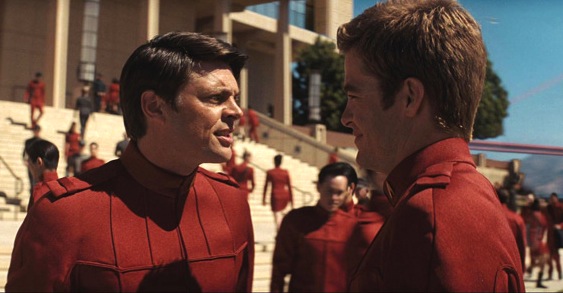
This is no news to anyone who knows how original Trek operates. McCoy is the ultimate humanist of Kirk’s crew. He values quality of life and emotional variables and the flaws bound up in human nature. He expects the unexpected. He questions humanity’s right to everything they attempt. He’s also a little grumpy, and it suits him. He is half-surgeon, half-therapist, and all glib retorts.
His purpose on the Enterprise extends far beyond being a Chief Medical Officer. McCoy deliberately sets himself up as the person Spock must spar with, allowing Kirk to get an opposing opinion. It would be all too easy to go along with Spock’s perspective in most situations; he’s staid, sensible, and presents facts to back up his rhetoric. He’s a scientist. What he offers to Kirk, McCoy parries against by grousing, snapping, and generally making a nuisance of himself. It leads to perhaps one of the best paradoxes in Star Trek—the chief doctor of a starship constantly being on the ship’s bridge for no good reason at all.
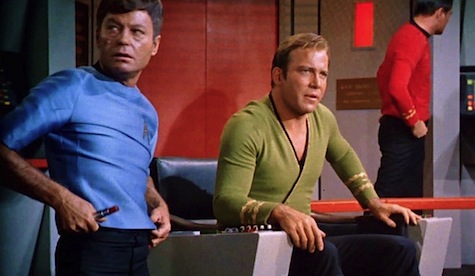
Why is any of this important in a film? Because if Spock and McCoy don’t have anything to argue about—you are doing Star Trek wrong. It’s literally that simple. Trek is designed to make people ask questions, and the dichotomy of Spock and McCoy is an embodiment of that. They debate on behalf of the audience. They mull over the rough queries that we’re meant to consider along with them. If McCoy is only there so he can run to-and-away from things on planet side missions, you’re letting the audience know exactly what they’re watching: A senseless action flick. And I’m not saying that Trek films shouldn’t have action in them (action is awesome!), but that should not be the defining genre in which they exist.
Also? If you keep McCoy off the roster, you’re deliberately undermining (or outright disallowing) character development.
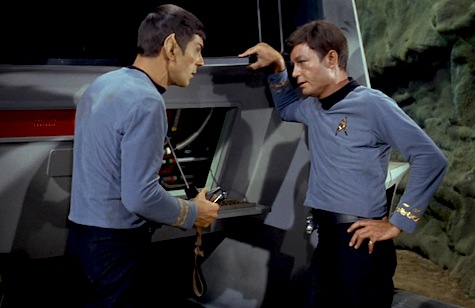
Look, it’s a big blockbuster film, I get it, but those should still have character development in them no matter what anyone says. (I will seriously fight everyone on this.) And while Kirk and Spock do promote growth in each other, the person who is best at pushing both of them out their comfort zones is McCoy. He’s not afraid to say the scary stuff, to nag people until they live up the potential he sees in them. If you put so much stock into the Kirk-Spock dynamic that you avoid the Spock-McCoy one, you’re robbing Trek of one of its most interesting interpersonal relationships. It’s not good enough for the pointy-eared Vulcan and the country doctor to antagonize each other—they have to love each other while doing it. They are not a trope, they are a team.
And if you want Kirk to make big boy steps as a human being (especially in this raw, lost, very very young incarnation), then you need McCoy leaning against the Captain’s chair and giving him crap. Kirk and Spock make each other feel good about themselves, and that’s a great quality in a friend, but not one that leads to much introspection. Leonard McCoy is the first person to tell Kirk when he’s being pig-headed, when he’s crossing a line, when he’s leaping without looking. He keeps Jim Kirk honest, even while he’s praising him.
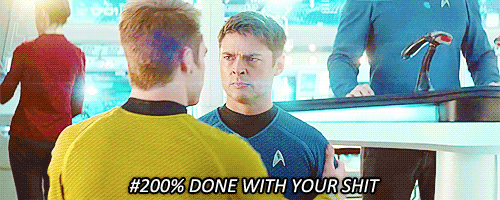
If you need any further proof of this dynamic, look no further than the Star Trek films that have come before. These characters continued to develop as people up until their final outings, over the course of 30 years, which is a big feat for pop culture figures. And in practically every case, this ends up being the result of McCoy picking a fight with Kirk or Spock or both of them. Or the result of him forcing something so simple as a conversation. People don’t love these characters for gags and one-liners. They love them because they had journeys, they felt real. Doctor McCoy was a sizable component of that feeling.
Doctor McCoy is symptomatic of everything that made Star Trek work fifty years ago. If he’s no longer part of the narrative, it’s no wonder the reboot universe feels a little less authentic. For the next film, they’d be well served to Boldly Go, of course—and if they know what’s best for them, McCoy will be on the bridge the whole movie for no good reason at all.
Gifs from moviepilot.com and ninjacousins on Tumblr.
Emmet Asher-Perrin would be fine if the whole third Trek reboot film just sat everyone in a room to argue space ethics. She would also accept a retelling of “I, Mudd.” You can bug her on Twitter and Tumblr. Read more of her work here and elsewhere.










